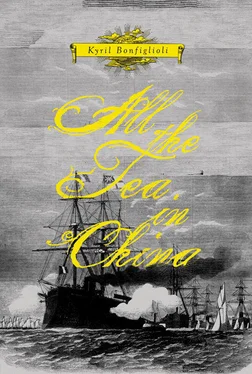This alarm was nothing to my feelings when the wind first hit us: the impact was such that I thought we had struck a great rock. But the blow was from behind: the ship leaped forward like a maddened horse, I could hear the water roaring against the skin of the ship, the yelling, then the screaming of the tortured rigging and above all the demented bellow of the prodigious wind. Again and again I was sure that this was the climax, that nothing could exceed such violence, no force on earth make a more deafening clamour, but again and again I was proved wrong as the clamour grew more intolerable. At last, insane with the noise and the terror, I clapped my hands to my ears and rushed on deck, determined to confront death sooner than later — and not in that rat-trap of a cabin. As I emerged the hellish din was heightened by an explosion — or so it seemed — as the fore staysail burst into tatters. We lost steerage-way, yawed, and in an instant we were pooped by a cliff-like wave which had been pursuing us. A thousand tons of grey water thundered the length of the ship, lifting me as though I were a fragment of paper and burying me oceans deep. I knew that I was a dead man, there was no question of it, my eardrums cracked, water spurted into my nostrils and, as I opened my mouth to scream, my lungs were instantly so gorged that I could feel them begin to split with the pressure. In the few instants it took to die the whole of my past life flashed in review across my inner eye: this was a disgusting experience.
I awoke in hell, which did not surprise me, all things considered. A black, glistening demon, ten feet high, was tormenting me excruciatingly, crushing my agonised ribs with his great hands. I spewed a gallon of sea-water at him. He turned me over and attacked my chest from behind. It was intolerable — and I knew that the torments would continue through all eternity. I vomited another gallon.
“Din’t eat yo’ nice supper, did you, Maz Cleef,” said the Doctor reproachfully, making me sit up and forcing my head between my knees. “Don’ tell me different: I seen you brung up nothing but sea-water. Might a gone to glory on a empty stomach; ain’t no sense in that now.”
As my eyes cleared and the shards of my wits reassembled themselves I became amused at the sense of disappointment that I felt. I began to cry, then to giggle idiotically. The Doctor smacked me hard across the face and I sank into a happy sleep.
What had happened, it seemed, was this: the great mass of water had wedged me into the bowsprit-rigging — in the angle between the martingale-backstays and the dolphin-striker, to be exact — and, as the ship stood on her tail after the wave had passed, gravity had thrown me onto the fo’c’sle, along the deck, where I caromed off the mainmast bitts and fetched up against the galley. The Doctor had plucked me inside, just before the next pooping.
“Were many drowned?” I asked when I could speak again.
“Of course not,” said Peter. “Everyone else had the sense to be lashed to something stout — or to stay below when told to. Do your bruises hurt much?”
“Yes” I said. “Very much.”
“Good,” he said. But he said it with a kindly grin.
Strangely enough, I slept through the last of the wind’s fury and, two mornings later, went on deck to snuff the wonderfully clean air. It must, in fact, have been almost the end of the morning for the comprador was standing behind the Captain holding the mahogany box which contained his quadrant (for our Captain did not hold with the new-fangled sextants) and the ship’s chronometer hung about his neck. (The sun is “shot” through the “hog-yoke” as Lubbock called the quadrant in his rough Yankee way, at noon, you understand.)
The sails were backed and, as Peter called out the time of noon, the Captain fiddled with the quadrant and soon gave Peter some figures. Peter scrambled to the chart-room and was back in less than a minute, handing the Captain a slip of paper which he gazed at with what seemed a kind of satisfaction.
“I’ll have a sounding, if you please, Mister,” he growled.
Lubbock — it was in fact his watch but Peter was usually on deck when there was a chance of a sun-sight because Lubbock’s arithmetic was that of the beasts of the field — roared his orders.
“Transom, there, fly the blue pigeon! Smart you now!”
In a trice the deep-sea lead was out of its locker abaft the fo’c’sle and Transom was whirling it about his head. (Why “swinging the lead” has come to be a term for idling is a mystery to me for, even with the little six-pound hand-lead and twenty fathoms of line in a flat calm, taking soundings is an arduous and testing work enough; and casting and coiling in the full deep-sea lead again and again, while balanced in the chains in foul weather and, perhaps, darkness is a labour for Hercules himself.)
Transom sang out numbers of fathoms which now I forget but which seemed to gratify the Captain.
“Arm it!” he cried. Transom ran to the locker and stuffed some mutton-fat into the hollow of the lead and hove it again.
The Captain thumbed out the resulting mess and sniffed it, felt it, even chewed a morsel of it. He now seemed uncommonly elated and positively capered to the chartroom.
“Happy as a dog with two cocks,” growled Lubbock.
“Why?” I asked civilly.
He shrugged. I suspect he did not know. The Captain emerged and gave Peter a course which Peter retailed to the steersman and soon there was much bracing of yards and hauling upon this and that rope until we were heading almost due west, with the wind on our starboard beam.
Within an hour we had raised an island, Namoa, which lies in the Bay of Swatow and was, so Peter assured me, a capital place for the selling of illegal opium of poor quality. When I say that this island is quite three hundred sea miles north of Macao you will begin to understand the ferocity of the typhoon which had driven us there in one day and a half.
“What a splendid seaman our Captain is, to be sure!” I murmured admiringly.
“Yes indeed, Karli,” said Peter, smiling at me in a friendly way.
When we reached the anchorage at Namoa I was alarmed to see two large junks, clearly men-of-war and heavily armed, riding inshore of us. One flew an enormous silken pennant, embroidered with dragons: this, Peter told me, denoted a petty Admiral of the Chinese Navy.
“Will they fight?” I asked bravely.
Lubbock, who was leaning over the rail of the poop and had heard, answered for him.
“Will they fuck,” he said in his coarse fashion.
No sooner were we swinging with the tide than a scow put off from the side of that junk which bore the imposing flag. Plainly to be seen in it, clothed in great finery and puffing at a long pipe, was a grossly fat man, surrounded by well-dressed servants who fanned him incessantly. In his cap was the button of a mandarin. I did not, at that time, know the insignia of the different grades of mandarin and at this time I have forgotten them.
Peter whistled.
“The Clam-Jandrum himself,” he said, “Governor of the whole district.”
“Has he come to arrest the ship?”
“Not he. Watch the Captain.”
The Captain was at the gangway, clad in his best uniform and flanked by two miraculously-scrubbed seamen and, behind them, his two servant boys. The representative of the Court of Heaven was prised out of his armchair in the sternsheets of the scow by his rattan-hatted servants and our Captain himself, having bared his head, assisted the great bulk aboard. The party proceeded to the cabin with measured tread. A moment later I was sent for: I was to bring the schroff and a ledger. Any ledger.
In the cabin the mandarin reclined on the sofa at full length, sucking wetly at one of the Captain’s biggest cigars and disdainfully sipping a tumbler of gin. The Captain was standing, a servant on each side. The schroff began to interpret.
Читать дальше












